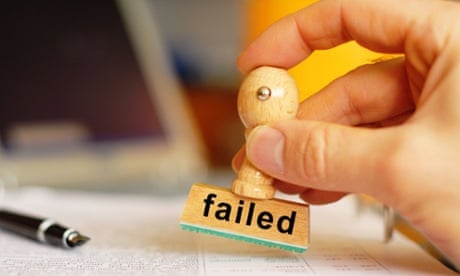University and College Union wants to move away from applications based on predicted grades after study finds just 16% are correctly forecast

UCU is calling for a post-qualifications admissions system. Photograph: Frederick Florin/AFP/Getty Images
University workers are demanding an overhaul of the UK higher education application system after a report revealed that five out of every six predicted results for A-levels turns out to be wrong.
Research commissioned by the University and College Union (UCU), which analysed the results of 1.3 million students over a three-year period, found that the majority of students applying to university are predicted better results than they ultimately achieve.
The study by Dr Gill Wyness of the University College London Institute of Education revealed that just 16% of applicants’ grades were predicted correctly; three-quarters were over-predicted and 9% were under-predicted.
Under the current system, most students make applications to universities based on their predicted grades, which leads to uncertainty for both students and institutions when results differ from predictions – as they frequently do. Many students end up securing places through the clearing system.
The UCU is advocating a new post-qualifications admission system where students only apply after they have received their final results, which would create greater certainty for both student and institution. The union also believes it would get rid of the growing use of unconditional offers, which it describes as “unethical”.
UCU general secretary, Sally Hunt, said the report exposed the majority of predicted grades as little more than “guesstimates”, which were an inadequate basis on which young people and universities were asked to make key, life-changing decisions.
“This report is a damning indictment of a broken system, not the hardworking teachers tasked with the impossible job of trying to make predictions,” said Hunt. “The results strongly support our call for a complete overhaul of the system, where students apply after they receive their results. It is quite absurd that the UK is the only country that persists in using such a broken system.”
The research found that state schools were most likely to overpredict; it also found that the grades of the most able students from disadvantaged backgrounds were the most likely to be underestimated, which in led them to apply to lower-tariff institutions for which they were overqualified.
Wyness’s report states: “The UK’s unique system of grade prediction has been widely criticised by policymakers and the media, yet the system has remained unchanged for many years. I find a high level of inaccuracy of grade prediction. Among the best three A-levels students achieve, only 16% of higher education applicants’ grades are accurately predicted.
“However, the vast majority of applicants actually receive predictions that are too optimistic for the grades they actually go on to achieve, with 75% of applicants achieving lower grades than predicted.
“It seems highly inefficient to continue with a system in which life-changing decisions are made, and scarce university places are allocated, on the basis of inaccurate information.”
Researchers analysed the top three A-level results from all participants who sat A-levels in 2013, 2014 and 2015 and went on to higher education, involving approximately 452,000 entrants a year.
A UCU survey last year found that 70% of staff were in favour of change to a system with applications after results rather than before. The UCU argues that it would enable greater transparency in the application and admission process, particularly given the lifting of the cap on student numbers.
University workers are demanding an overhaul of the UK higher education application system after a report revealed that five out of every six predicted results for A-levels turns out to be wrong.
Research commissioned by the University and College Union (UCU), which analysed the results of 1.3 million students over a three-year period, found that the majority of students applying to university are predicted better results than they ultimately achieve.
The study by Dr Gill Wyness of the University College London Institute of Education revealed that just 16% of applicants’ grades were predicted correctly; three-quarters were over-predicted and 9% were under-predicted.
Under the current system, most students make applications to universities based on their predicted grades, which leads to uncertainty for both students and institutions when results differ from predictions – as they frequently do. Many students end up securing places through the clearing system.
The UCU is advocating a new post-qualifications admission system where students only apply after they have received their final results, which would create greater certainty for both student and institution. The union also believes it would get rid of the growing use of unconditional offers, which it describes as “unethical”.
UCU general secretary, Sally Hunt, said the report exposed the majority of predicted grades as little more than “guesstimates”, which were an inadequate basis on which young people and universities were asked to make key, life-changing decisions.
“This report is a damning indictment of a broken system, not the hardworking teachers tasked with the impossible job of trying to make predictions,” said Hunt. “The results strongly support our call for a complete overhaul of the system, where students apply after they receive their results. It is quite absurd that the UK is the only country that persists in using such a broken system.”
The research found that state schools were most likely to overpredict; it also found that the grades of the most able students from disadvantaged backgrounds were the most likely to be underestimated, which in led them to apply to lower-tariff institutions for which they were overqualified.
Wyness’s report states: “The UK’s unique system of grade prediction has been widely criticised by policymakers and the media, yet the system has remained unchanged for many years. I find a high level of inaccuracy of grade prediction. Among the best three A-levels students achieve, only 16% of higher education applicants’ grades are accurately predicted.
“However, the vast majority of applicants actually receive predictions that are too optimistic for the grades they actually go on to achieve, with 75% of applicants achieving lower grades than predicted.
“It seems highly inefficient to continue with a system in which life-changing decisions are made, and scarce university places are allocated, on the basis of inaccurate information.”
Researchers analysed the top three A-level results from all participants who sat A-levels in 2013, 2014 and 2015 and went on to higher education, involving approximately 452,000 entrants a year.
A UCU survey last year found that 70% of staff were in favour of change to a system with applications after results rather than before. The UCU argues that it would enable greater transparency in the application and admission process, particularly given the lifting of the cap on student numbers.


